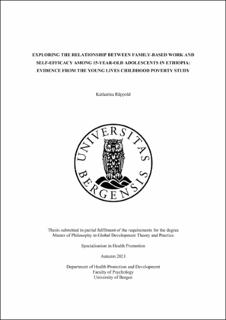| dc.description.abstract | Adolescence marks a unique period in life where psychosocial skills are developed that are understood to positively affect the individuals’ mental health and contribute to success in later life. Self-efficacy is a key psychosocial skill that describes the individuals’ belief of their capability to exercise control over their life. While family-based work (economic and non-economic activity performed for and within the family) often is an integral part to maturing into adulthood in low- and middle-income countries, its impact on psychosocial skills is under-researched. Hence, the objective of this study was to explore the relationship between family-based work and its duration, and general self-efficacy among 15-year-old adolescents in Ethiopia. To gain a more comprehensive understanding of the relationship, an ecological approach was adopted. While a variety of ecological factors are worth considering, this study assessed the influence of time spent at school and the adolescent-parent-relationship as additional independent variables. The study utilized secondary data from Round 5 (2016-2017) of Young Lives’ longitudinal study of childhood poverty conducted in Ethiopia. The sample comprised of 1620 adolescents who were approximately 15 years old at the time of the data collection. Hierarchical multiple regression was used to firstly, determine which independent variables help explain the dependent variable, and secondly identify the positive or negative relationship and magnitude of an association between independent and dependent variables. In adjusted linear regression models a small, but negative and statistically significant association between working hours and self-efficacy was observed. Time spent at school was found to slightly amplify the negative impacts of family-based working hours on adolescents’ self-efficacy levels. In contrast, the parent-adolescent-relationship attenuated the negative impact. The study results indicate that family-based working hours do not impact largely on Ethiopian adolescents’ belief about their capabilities to shape their destiny. Further, the results lend support to researchers arguing working and attending school simultaneously are competitive in terms of psychosocial development. Moreover, the results substantiate findings from previous literature that assign the family a vital role in forming adolescents’ self-efficacy beliefs. Further quantitative and qualitative research may expand on the findings of this study and thereby contribute to the design of policy interventions that are respectful to adolescents’ agency and translate meaningfully to their work. | |
